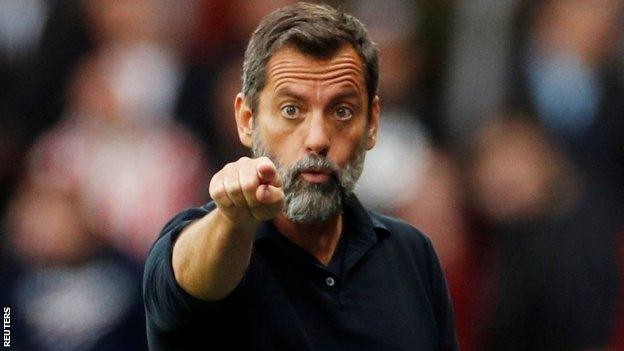Quique Sanchez Flores: Where did it go wrong for ex-Watford boss?
- Published

Quique Sanchez Flores lasted less than three months at the Watford helm in his second spell
Watford's decision to sack Quique Sanchez Flores after only 10 Premier League games is based is one simple reality - the Hornets know they must remain in the Premier League at all costs and that status is already at serious risk.
Those behind the scenes at Vicarage Road have worked tirelessly to ensure Watford not only arrived in the Premier League but stayed there.
Watford's 2-1 loss at Southampton, unfortunate as it was, signalled the end for Flores as it put the Hornets bottom of the table with only eight points from 14 games.
So how has it all gone wrong so quickly?
Sanchez Flores gamble fails
Watford's hierarchy, the Pozzo family and chief executive Scott Duxbury, are decisive in managerial matters - whether they are incomings or outgoings.
The announcement of the return of Flores on 7 September came just 30 minutes after the confirmation of the sacking of Javi Gracia, who had lost three of the first four Premier League games this season.
Gracia took Watford to 11th place in the Premier League and Watford's second FA Cup final last season, a landmark Wembley moment for the club although it ended in a 6-0 thrashing at the hands of Manchester City.
After Gracia's departure, it was a gamble to turn to fellow Spaniard Sanchez Flores, who had previously had one season at Vicarage Road, guiding them to a respectable 13th-place finish in 2015-16.
Based on that campaign, there was a measure of logic in the decision, ensuring that while it was greeted with surprise, there was also optimism.
However, Sanchez Flores has been unable to turn the tide, apart from one win away to Norwich City which may yet be seen as a priceless three points.
It all started well enough as Watford battled back from two goals down to draw with Arsenal in his first game but the rot set in with an 8-0 loss at Manchester City - an occupational hazard for many managers but it was the powerlessness and acceptance of the thrashing that hinted at deeper, more serious problems.
And the credits were rolling once they had lost 3-0 at home to Burnley on 23 November. It was a dismal, damaging result and performance for Watford and Sanchez Flores - only confirmed by the sight of both manager and chief executive Duxbury shaking their heads in disbelief once Southampton had overturned a one-goal deficit at St Mary's on Saturday.
Sanchez Flores has been unfortunate to be without injured talisman Troy Deeney, an inspiration, leader and spearhead on the pitch who has played only 34 minutes under the manager since having knee surgery in August.
Ismaila Sarr was signed before Sanchez Flores' arrival for what was a club record fee in excess of £25m from Rennes, but his goal in the loss at Southampton was his first in the Premier League.
Sanchez Flores has failed to make the most of Watford's attacking options, with only seven goals in those 10 league games and once the leaks at the back became more pronounced, it was all over.
There was an element of risk in Watford's return to Sanchez Flores. The risk of relegation is now even greater so he has had to go.
Is Watford's structure at fault?
This is the question that will come attached to the arrival of a third manager in a season before Christmas is in full swing.
Watford's hierarchy will argue, and they can back it up, that their expertise is in providing the conditions behind the scenes for a manager (or head coach) to do his best work on the training ground.
And they will point to their recent continued presence in the Premier League without very serious relegation concerns as proof it has worked.
There is no suggestion the way the club works will change any time soon.
The coach looks after the football while Watford provides a worldwide scouting network which uncovered Richarlison ahead of other suitors, signed for £11m from Fluminense and sold to Everton in a deal that could eventually reach £50m.
They believe providing stability behind the scenes allows coaches to work to their best level without distraction - and then it is up to them.
Watford's logic, once explained in detail by Duxbury to BBC Sport, is that a manager's life at a mid-table club is a short one, perhaps two years at best. The person in question will either do well and be a target for others or there will be problems and a decision must be taken, as with Sanchez Flores.
The Pozzos' first appointment, Gianfranco Zola, guided Watford to a Championship play-off final while Slavisa Jokanovic took them to the Premier League before a contract dispute resulted in his departure.
Sanchez Flores and Italian Walter Mazzarri spent one campaign each at Watford cementing that status - there is always an end of season review to evaluate mutual ambitions and goals and those decisions were made based on that reflection - while they will always be convinced Everton's unwanted interest took Marco Silva's eye off the ball.
Where Watford have been forced to change tack this season is in making managerial changes during a season.
This is something they have tried to avoid in the past, although they felt they were pushed into a corner with Silva, when results dipped after Everton's approach.
For all the 'hire 'em, fire 'em' reputation the club has acquired in some quarters, these are decisions Watford will have reached reluctantly and only because they felt results and performances were putting Premier League status in danger.
Watford have remained in the top flight since promotion in 2015. The club believes this is vindication of their rounded approach but there is no escaping the fact that the choice of Sanchez Flores' successor and how they fare constitutes arguably the most important decision Watford's power-brokers have made in their time at the club.
